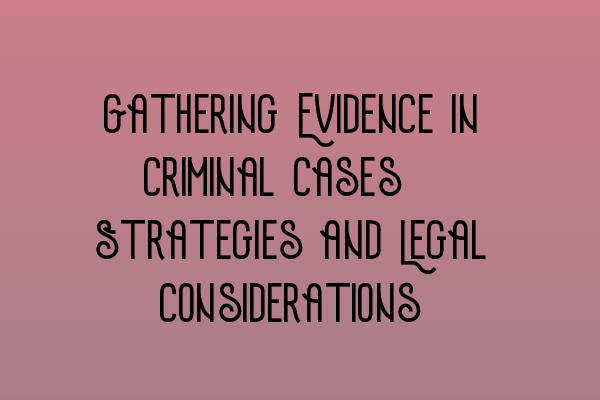Gathering Evidence in Criminal Cases: Strategies and Legal Considerations
Welcome to SQE Criminal Law & Practice Law UK, where we provide comprehensive legal guidance and expert advice on criminal cases. In this blog post, we will discuss the importance of gathering evidence in criminal cases, along with strategies and legal considerations to ensure a strong defense or prosecution.
When it comes to criminal proceedings, evidence plays a crucial role in establishing the truth, proving or disproving allegations, and ultimately influencing the outcome of the case. It is vital for legal professionals to understand the various techniques and approaches to gathering evidence effectively.
1. Understanding the Types of Evidence
Before diving into the strategies, it is essential to grasp the different types of evidence that can be presented in court. These include:
- Physical evidence: Any tangible item that can be introduced in court, such as weapons, documents, or DNA samples.
- Testimonial evidence: Statements or accounts given by witnesses or individuals with relevant knowledge.
- Circumstantial evidence: Indirect evidence that implies a fact but does not directly prove it.
- Expert evidence: Opinions or interpretations provided by professionals with specialized knowledge or expertise.
Understanding the different types of evidence allows legal professionals to identify the most appropriate strategies for gathering evidence based on the nature of the case.
2. Strategies for Gathering Evidence
Here are some proven strategies that can aid in the effective collection of evidence:
- Crime scene investigation: Conducting a thorough examination of the crime scene to collect physical evidence, document observations, and preserve the chain of custody.
- Witness interviews: Interviewing witnesses to gather testimonial evidence that supports the prosecution or defense.
- Surveillance and monitoring: Monitoring activities or individuals to gather evidence, especially in cases involving organized crime or ongoing criminal activities.
- Documentary evidence: Analyzing documents such as contracts, financial records, or emails to uncover relevant information.
- Expert opinions: Consulting with experts in various fields to obtain their professional opinions and interpretations of the evidence.
Utilizing these strategies increases the likelihood of securing compelling evidence that can strengthen the case in court.
3. Legal Considerations
While gathering evidence, it is imperative to adhere to legal considerations to ensure that the evidence is admissible and reliable:
- Chain of custody: Properly documenting the custody and handling of the evidence to establish its authenticity and prevent tampering.
- Privacy laws: Respecting privacy rights when gathering evidence, especially when dealing with sensitive information or conducting surveillance.
- Search and seizure: Understanding the legal requirements for searches, seizures, and obtaining warrants to avoid infringing on constitutional rights.
- Expert qualifications: Ensuring that any experts providing opinions or interpretations meet the necessary qualifications and standards.
By considering these legal aspects, legal professionals can uphold the integrity of the evidence presented in court.
At SQE Criminal Law & Practice Law UK, we understand the complexity of gathering evidence in criminal cases. Our team of experienced solicitors is equipped with the knowledge and skills to guide you through every step of the legal process.
If you require further assistance or legal representation, please do not hesitate to contact us. We are committed to providing top-quality legal services and achieving the best possible outcomes for our clients.
